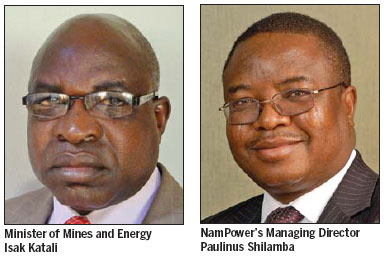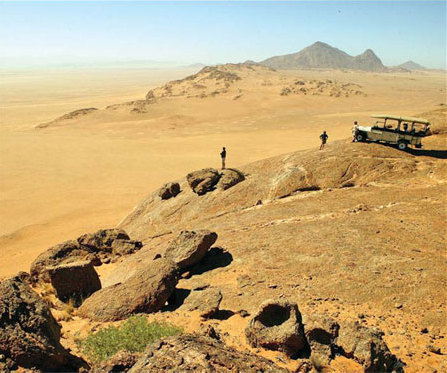Africa's beacon of stability
Updated: 2013-09-11 08:12
(China Daily)
|
|||||||||||
Namibia offers Chinese investors a safe, stable and profitable business climate
Offering enviable economic, social and political stability, the Republic of Namibia is a shining star in southern Africa and a fast-growing destination for foreign investors seeking lucrative returns in areas such as mining, energy, infrastructure development, transport and fisheries.
With a strategic geographical position in the continent's southwestern corner, the ambitious country of 2.3 million people is targeting foreign direct investment from long-established trade and political partner China as it strives to achieve its many challenging "Vision 2030" goals.
In the short term, the comprehensive fourth National Development Plan, or NDP4, is the latest stage of the country's strategic socioeconomic blueprint and comprises three key aims: faster and sustainable economic growth, job creation and enhanced income equality.
President Hifikepunye Pohamba said: "Part of the NDP4 involves international partners who are encouraged to work with us to develop our economy. China is a great friend that has helped Namibia ever since independence 23 years ago and assisted our economic and social infrastructure development.
Lucrative opportunities
Highlighting the importance of the rule of law in Namibia, President Pohamba said foreign investors know they can form joint ventures with Namibian companies as the country seeks to develop its fledging oil and gas industry.

"We would like to invite more Chinese companies, especially in mining, agriculture and tourism because if these industries are developed, we'll be able to create employment for our citizens," the president continued.
"Namibia has the ideal climate for grape growing, so could become a wine producing country. Fish and beef currently go to Europe, however there is huge potential in China. Once we have opened up the market in China, we will intensify the production of these items. From China, we need textiles and machineries so we can come and use them for agriculture. We need tractors to produce more food. There are many things that we can use from China."
Mining is currently the largest revenue earner for Namibia's economy. The country is blessed with vast mineral resources like diamonds and huge deposits of precious metals such as gold, copper, and zinc. In the meantime, Chinese investment is about to put Namibia on the world uranium mining map.
As part of its drive towards economic diversification, Namibia is developing its energy industry in the upstream and downstream sectors. Mines and Energy Minister Isak Katali was quick to highlight the importance of the Kudu gas field that will be used to generate electricity and will be run by national power utility NamPower.
"We have various projects to make sure our people have electricity and the Kudu gas project is the main one," said Minister Katali. "We think it will be ready for the second half of 2017. It will give us enough electricity locally and we'll even be able to export. Namibia has many natural resources and minerals that have not been explored, found, quantified or qualified. We are eager for people to partner with us, but they have to work with us and not only remove the minerals and export them."
Paulinus Shilamba, managing director of NamPower, said: "The Kudu gas project is one of the most important in the country. We are responsible for the construction of the $1.2 billion power station and require an upstream partner to realize this."
With the prospect of oil on the horizon, the National Petroleum Corporation of Namibia , or NAMCOR, is gearing up to find international partners with the know-how and capital that will help this become a firm reality. It is an exciting time for the country and Obeth Mbui Kandjoze, NAMCOR's dynamic managing director since November 2012, is seizing the new possibilities.
"From a geophysical point of view, we have every confidence that NAMCOR has got what it takes," he said. "We may not have struck oil yet, but we know we have the right geology. Although we started out as a State-regulated industry, we have moved on considerably. Today we have a situation whereby the investor takes the lion's share of the equity. In accordance with that, we take a minority stake. We are present within every phase, from pre-production, right up to the production phase. It is a high-risk and high-investment business."
"Our approach has had to be an innovative one if we are going to compete with the big guys. This means we have to set up joint ventures and take a 10 percent stake in different projects, and then agree at a later date the payback terms if we strike oil. Of course, if we do manage to make that discovery, we would be in a position where we could manage that 10 percent on an operational level.
"We make sure our partners take responsibility for training our professionals, as they have the expertise, finances and technology and can easily enable the transfer of skills and technology. This allows us to support the state as we can monitor the petroleum agreement that the government signs with these companies.
"Although this type of relationship has its challenges, the strategy to take minority stakes has proved extremely successful. We are participating in 77 percent of all licenses issued."
Downstream strategic plan
NAMCOR has expanded into the downstream sector in order to secure revenues and has been busy finalizing a strategic plan, the budget and the business plan. These are the key deliverables to the shareholder in compliance with the country's State-owned Enterprises Act, Kandjoze explained.
"The solidification of this strategy will be in place imminently. Trade with China is extremely important. I went there earlier this year. Our flagship project, the Kudu gas project, offers huge potential to Chinese investors. Gas is the underdog against oil, it is seen as a clean source of energy. We are in discussions with two Chinese companies at the moment. Interest is very high."
The managing director, who worked at De Beers, the Ministry of Mines, and in an Australian exploration company before joining the junior ranks of NAMCOR, said: "We are in competition with Angola, South Africa and even East African markets and some of them have mature supplies of the commodity that every investor is looking for. Namibia has, however, benefited from its ease of doing business. The gas project has allowed us to strengthen our relations with China. Our ability to turnaround on projects facilitates doing business with new investors; this is how we came to have the likes of Petrobras and BP. "I would underline to any potential investors that the acreage is here, the potential is here, and the conducive business environment is here. The system works."
|
Namibia boasts a wealth of natural resources and mineral deposits, including gold, diamonds and many precious metals. Photos Provided to China Daily |

(China Daily 09/11/2013 page5)
